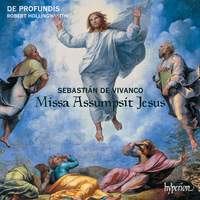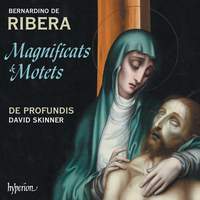Interview,
Mark Dourish on De Profundis
 Formed in 2011 by Mark Dourish, De Profundis draws some of the finest musicians from the Cambridge area together and specialises in performance of early vocal music at low pitches with an all-male ensemble - consistent with much of what's been uncovered about contemporary attitudes to the voice as an instrument.
Formed in 2011 by Mark Dourish, De Profundis draws some of the finest musicians from the Cambridge area together and specialises in performance of early vocal music at low pitches with an all-male ensemble - consistent with much of what's been uncovered about contemporary attitudes to the voice as an instrument.
Following the success of their initial release, featuring works by the Spanish composer Bernardinus Ribera, De Profundis have returned to Spain for a disc focusing on the opulent polyphony of Sebastián de Vivanco, a sadly-neglected composer who helped to bridge the gap between the earlier style of Morales and that of Palestrina.
Having previously quizzed Robert Hollingworth about some of the musicological details underpinning this album, I also managed to speak to Mark about his experiences setting up and running this choir, and the thinking behind its eponymous low-pitched sonority.
How did De Profundis first take shape, and how did you decide what its unique ethos and identity would be?
I founded the group in 2011 as a result of great frustration with the historically-uninformed way that continental Renaissance sacred music is usually performed nowadays. When the music was written in the sixteenth and seventeenth centuries it was intended to be sung at the written pitch and with adult male singers, female singers being frowned upon by the church authorities. In modern-day performances, the music is almost always transposed upwards by a significant margin to accommodate female sopranos on the top line. This has major knock-on effects for the other voices too: the result is a sound completely different to what was originally intended. With De Profundis we aim to get closer to the original timbre; that means taking the composer seriously when it comes to questions of pitch, and using adult male singers. The result is a much stronger, darker and richer sonority, and a sound where every voice is equally important - no more just focussing on the top line.
A huge inspiration for De Profundis was the amazing work done a generation ago by The Taverner Consort and Choir, their director Andrew Parrott, and the musicologist Hugh Keyte. Those guys really opened people’s minds and ears to the sounds that were possible when you treated the musicological evidence with respect and imagination. As you can imagine, it was a huge thrill when we were able to work with Andrew for the first time a couple of years ago. He’s just as curious, thought-provoking and musically astute now as he was in his younger firebrand days! Really I’m just following in his illustrious wake.
The choir mixes professional and high-level amateur singers on (one assumes!) a fairly equal footing. Is there a mentorship element here, and is it part of your mission to help produce the next generation of Renaissance choral musicians?
The choir is run along very egalitarian lines. I don’t really make any distinction between the amateur and professional singers in how they’re regarded or the work that’s asked of them. Unfortunately mentorship and nurturing the next generation of singers sound like a great idea, but isn't something that we can realistically take on at the moment. Speaking entirely practically, we only meet twice a year - only for a short time, and always with a concert looming. We’re always focussed on getting to know the music and producing a really good, well-tuned and well-balanced sound. Also, the line-up of performers changes with each concert due to people’s individual availability. If we had a more stable line-up and met more often and for longer periods then mentorship would probably come into it. Perhaps that will change in the future. Right now, though, De Profundis has to fit in with everything else I’m doing: I’m a full-time NHS GP, so De Profundis has to be run in my spare time!
There is a considerable, though largely little-performed, range of music for men’s voices from other eras – the German Romantics and Sibelius, for instance. Do you have any plans to broaden your focus in the future?
There’s more than enough Renaissance repertoire to be getting on with! I remember once reading a comment by Peter Phillips of The Tallis Scholars to the effect that if he kept on conducting polyphony until he retired, he’d still only have scratched the surface of the repertoire by the end. There’s no shortage of unknown, highly talented Renaissance composers deserving greater exposure. Also, I think venturing out of the Renaissance and into the Romantic period and beyond would probably require different, heavier voices than we have now. My own view is that that’s music for other groups to tackle.
We’re developing our own niche, which is continental Renaissance polyphony, with a particular focus on Spain. Morales, Guerrero and Victoria are all fairly familiar (though there’s lots of their music that’s still little-known!) but when you look beyond them there are some wonderfully talented figures who are inexplicably neglected and who need help, performance and exposure to have a chance of gaining their rightful place in the canon. For example, early next year we’ll be recording a CD of music by Juan Esquivel: he’s one of the last great Spanish polyphonists, and yet he hardly features in the CD catalogue. Of course, making a recording costs a lot of money, and inevitably we're trying to raise funds for this, so if anyone out there loves their Spanish music and wants to be a part of something unique at an early stage, we’d love to hear from them. We’re contactable via the website!
Missa Assumpsit Jesus was released on 29 June on Hyperion Records.
Available Formats: CD, MP3, FLAC, Hi-Res FLAC
Magnificats and motets, De Profundis' début recording, was released in July 2016 on Hyperion.
Available Formats: CD, MP3, FLAC, Hi-Res FLAC




